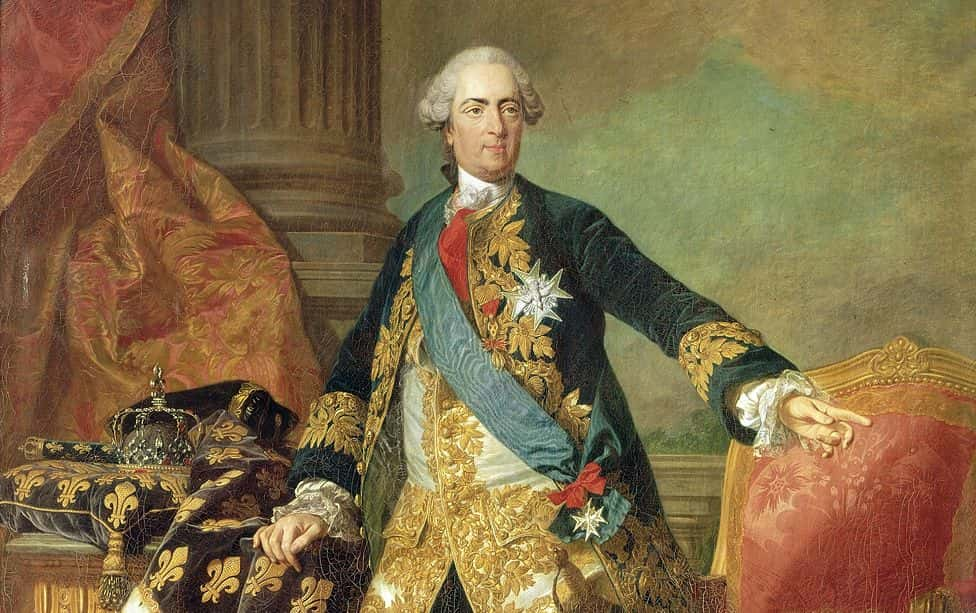Kings, like everyone else, have their own preferments and fascinations. However, Louis XV had a particularly morbid fascination with a gloomy subject - death.
The king's displayed a continued fascination with death which made his company uneasy. Madame du Hausset was in particularly good position to give an insight into the king's private character. As Madame de Pompadour's maid-of-honour, she was with the two of them on more intimate occasions. In her memoirs, she recalled an incident when the king was traveling to Crècy where Madame de Pompadour would entertain him. On the way, the king spotted a few crosses and ordered his carriage (and those of his entourage) to come to a halt.
Louis then called a groom and asked him to go to the graveyard to see if there were any signs of new graves having been dug. The groom (probably perturbed) went to do as he was told and returned with an affirmative answer; indeed, three new graves had recently been dug. Madame du Hausset recalls that the ladies in his company were visibly disturbed but does not mention the king's reaction.
It would appear that this fascination was not a temporary whim. Madame de Pompadour told her ever-present du Hausset that the king "loved talking of death". She was not the only one who noticed the king's strange conversation topics. The Duc de Cröy remarked that the king would sometimes change the subject of a conversation to death or the prayers said for the dying, even if the subjects had been markedly different.
 |
| The Duc de Cröy - who noticed the king's penchant for morbid topics of conversation |
Death was everywhere in the 18th century; rampant infant mortality, recurring epidemics, brutal criminal punishments and a very limited medical knowledge all contributed to a society that was frequently visited by death. Judging by the reactions of Madame de Pompadour and her ladies, they had no particular fascination with the same subject despite living in the same reality as the king.
The king's interest might stem from his early childhood. Before Louis turned 5 years old, he lost his father, mother and older brother; he would then lose his great-grandfather and found himself the last of that branch. Perhaps the young boy became intrigued by that intangible thing that deprived him of his closest family?
It certainly would not be odd, especially considering that he would live to see a good deal of his friends and family die around him. His wife, two sons (including the heir, Louis Ferdinand), two daughters-in-law, three daughters, a grandson and two mistresses all died during his lifetime. It probably did not help that some had rather dramatic deaths; Madame de Châteauroux, for instance, died in violent cramps. Others died suddenly such as Madame Henriette, who had complained a little of feeling tired but not ill - she died three days later.
This - as well as almost entirely ineffective medical knowledge - could well explain another aspect of the king's interest. He would, occasionally, attribute certain looks on his courtiers to be a sign of their impending death. For instance, he once (in the hearing of the person in question) remarked that a gentleman looked particularly pale. The king concluded that he probably had just one month left to live in.
 |
| Louis XV |
The odd thing was that while the king was deeply interested in mortality, he was also terribly afraid of dying. In his childhood, he had been drilled in the horrors of hell and the punishments awaiting unrepenting sinners there. It is hardly surprising, then, that a king whose personal life was well-known for its pleasures would fear the punishment of an after-life. It was said, that during his nearly fatal illness at Metz, he had been plagued by horrific hallucinations of exactly these punishments "dancing on his bedside". It would seem that the king's morbid fascination was much like watching a train-wreck: disturbing to look at, but hard to look away from.
It is claimed that the king's own demise would be a result of his peculiar interest. When he was out riding, he passed a funeral cortege and rode up to the mourning. He asked who their dearly departed was and what he had died of; he was told that the deceased had died of the smallpox at which he allegedly started and immediately turned his horse around. Despite his prompt departure, he was soon struck with the same illness - and died from it.

No comments:
Post a Comment